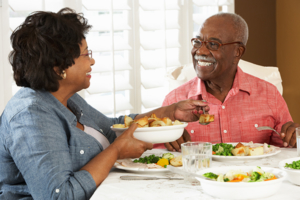Why Diabetic Seniors Need to Take Another Look at How They Are Managing Blood Sugar Levels

Doctors are rethinking the treatment and management of diabetes in seniors and the dangers low blood sugar levels can cause.
The most up-to-date guidelines from the Endocrine Society regarding the elderly and diabetes are surprising, to say the least: lower blood sugar isn’t always best. And for individuals who have been maintaining a regimen of finger pricks, insulin injections, and careful monitoring of food consumed, this alteration may be rather hard to swallow.
Known as de-intensification, geriatricians are now commonly using the approach with older adults that the advantages to be achieved by striving for meticulous blood sugar control are not outweighing the health risks inherent with aging and illness. When A1c and glucose levels are kept at very low levels within the elderly, for instance, it could possibly result in an increased occurrence of hypoglycemia and even kidney failure.
With up to one out of three older adults currently diagnosed with diabetes, these new recommendations are poised to have a staggering influence on the treatment and management of the disease for seniors, requiring a shift in mindset for many.
And not unexpectedly, many older diabetics are unwilling to welcome this change. In one patient’s words to Dr. Pei Chen, a geriatrician in the geriatric clinic at the University of California, San Francisco, “I’ve been doing this for 25 years. You don’t need to tell me what to do. I can handle it.”
The latest guidelines recommend an increase in A1c from 7 to 7.5% for seniors who are in good health; and up to 8 – 8.5% for all those with dementia, multiple chronic illnesses, or poor health. It is critical to note, however, that suggestions are extremely individualized centered on a variety of factors, and that at no time should high blood sugar be ignored in the elderly.
Responsive Home Care can help seniors stick to doctors’ guidelines to control diabetes and a number of other conditions with professional, customized, in-home care services for seniors. Just a few of the countless ways we are able to help include:
- Grocery shopping to guarantee the senior has a good amount of healthy food choices easily accessible
- Meal planning and preparation in adherence to your prescribed dietary plans
- Accompaniment to medical appointments, tests, and procedures
- Encouragement to engage in physician-approved exercise programs
- Medication reminders to ensure prescriptions are taken in the correct time as well as in the appropriate dose
- And more!
Contact Responsive Home Care, the home health services Hollywood, FL leaders, at 954-486-6440 to inquire about an in-home assessment and access a healthier lifestyle for a loved one you adore.

